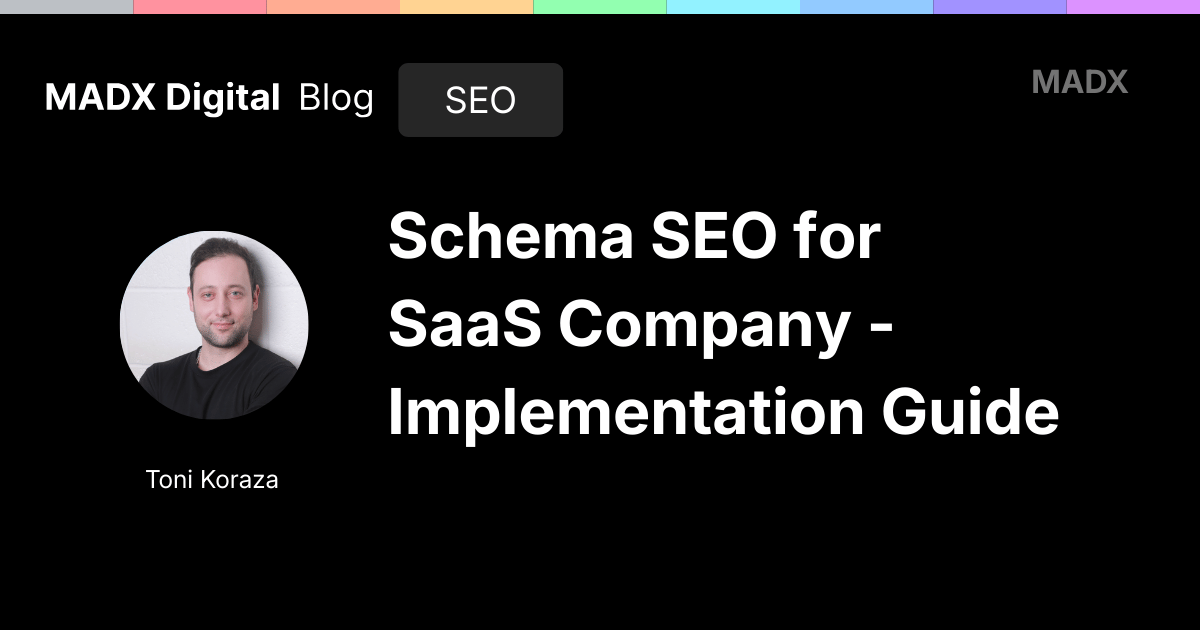Zero-Click Searches: How Brands Can Win With SEO and GEO

You’ve likely seen the headlines. Traffic is down, and zero-click searches are on the up.
It’s led many to declare that SEO is dead.
We’re here to tell you it isn’t. It’s just changing, and you need to adjust your strategies to ensure you don’t get left behind.
What We’ll Cover
The Zero-Click ‘Problem’
Zero-click searches are rewriting the rules of search. These are search results where users find the information they need directly on Google’s search results without ever visiting a website.
The numbers highlight the scale of the zero-click trend. In 2022, just 26% of U.S. searches ended without a click. That figure has now reached around 60%.
For enterprises and businesses that have invested heavily in organic search visibility and search traffic, this is a fundamental change: you can rank first on the search engine results page and still see declining traffic!
The Types of Zero-Click Searches
Not all zero-click results look the same. Google’s search results page now includes a mix of SERP features that give users answers without clicking through. The most common include:
Featured Snippets
Short extracts that are pulled directly from a website to give a quick answer. These appear at the very top of the results page (though in many cases, they are now being replaced by AI Overviews, so much so that we couldn’t find one for the example here!)
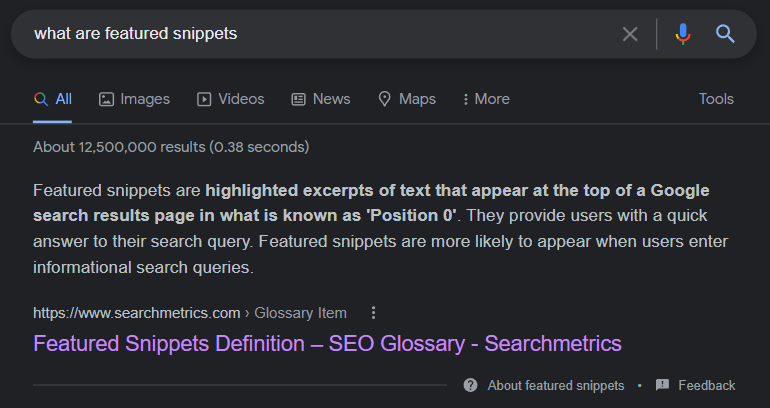
AI Overviews
Generative summaries created by Google’s AI that combine multiple sources into one response.
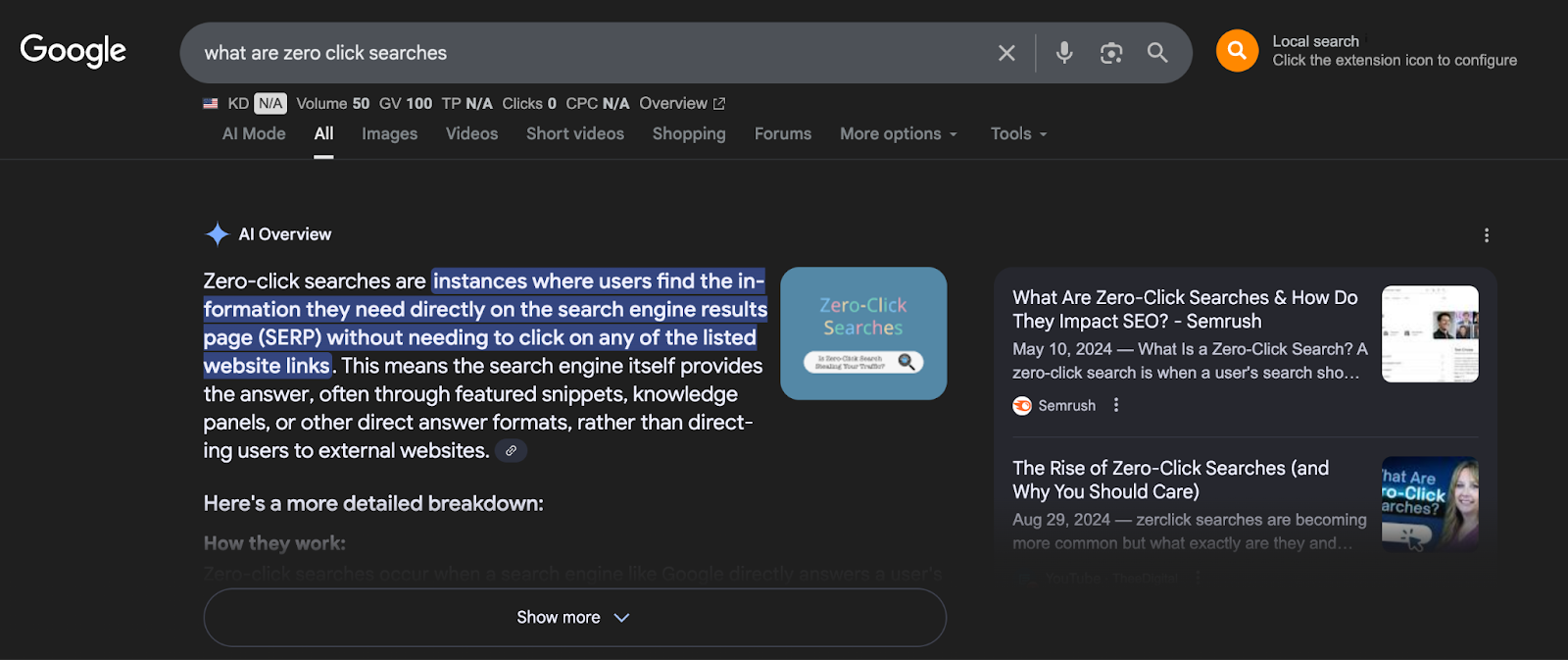
Knowledge Panels
Information boxes that surface details about a person, company, or topic are often taken from trusted databases.
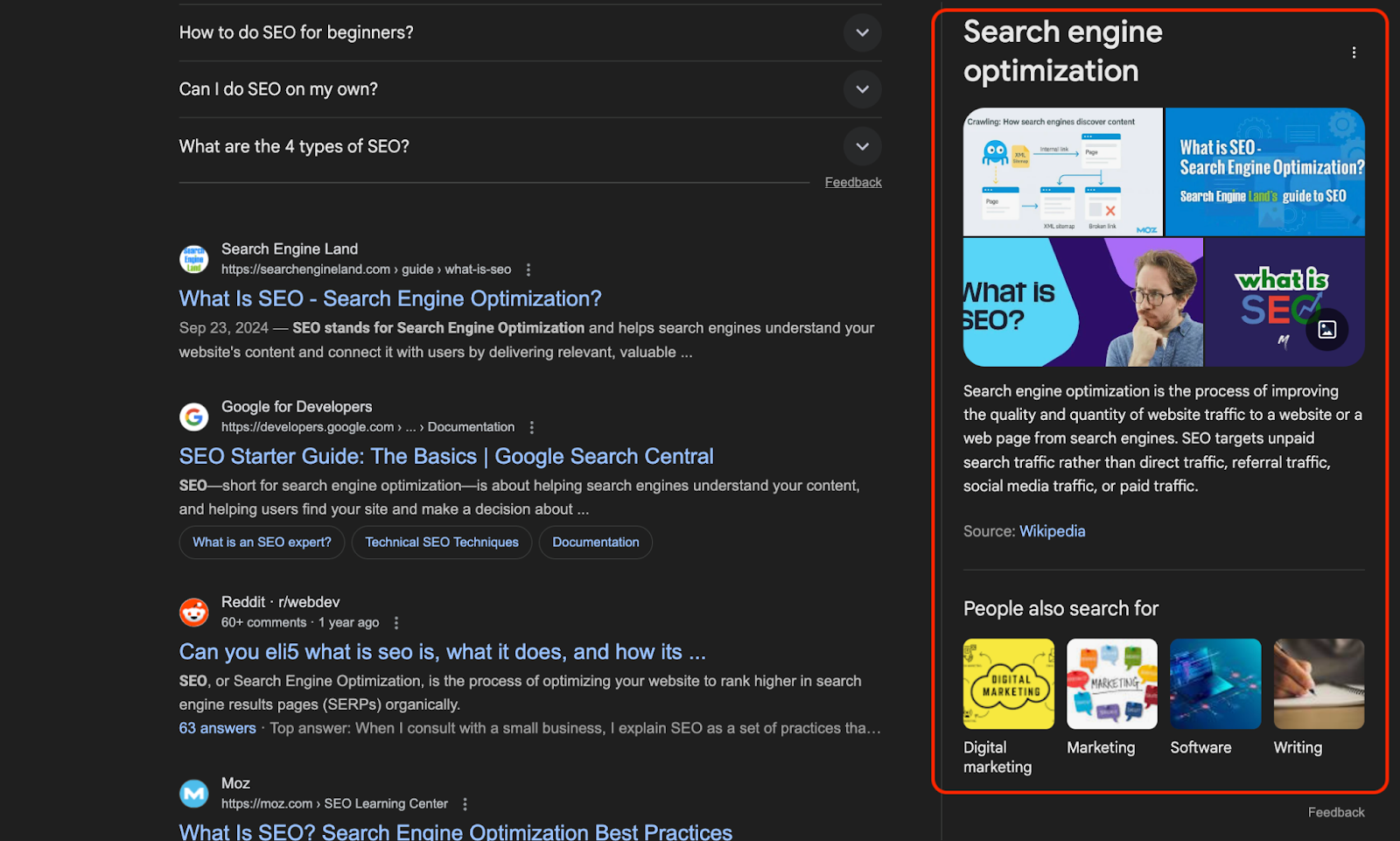
People Also Ask (PAA) Boxes
A list of related questions that expand into short answers, offering users additional context without leaving the page.
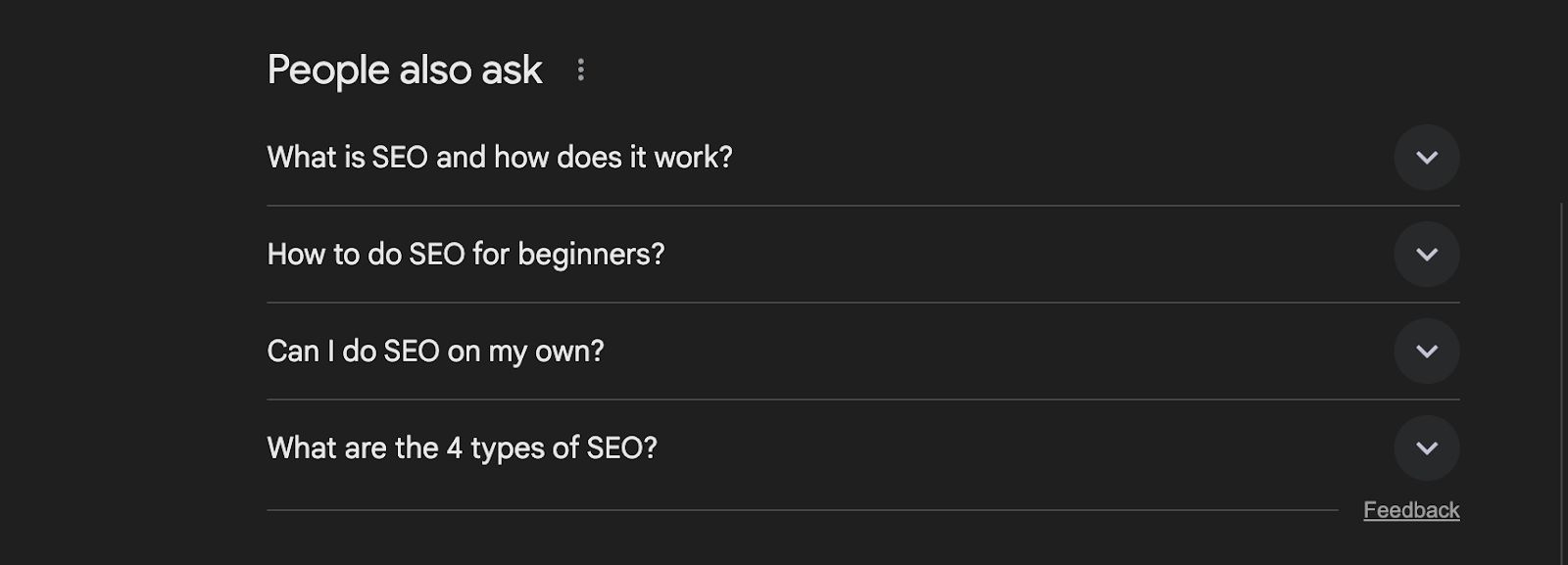
Local Packs
Map-based results that highlight local businesses, showing addresses, reviews, and contact info.
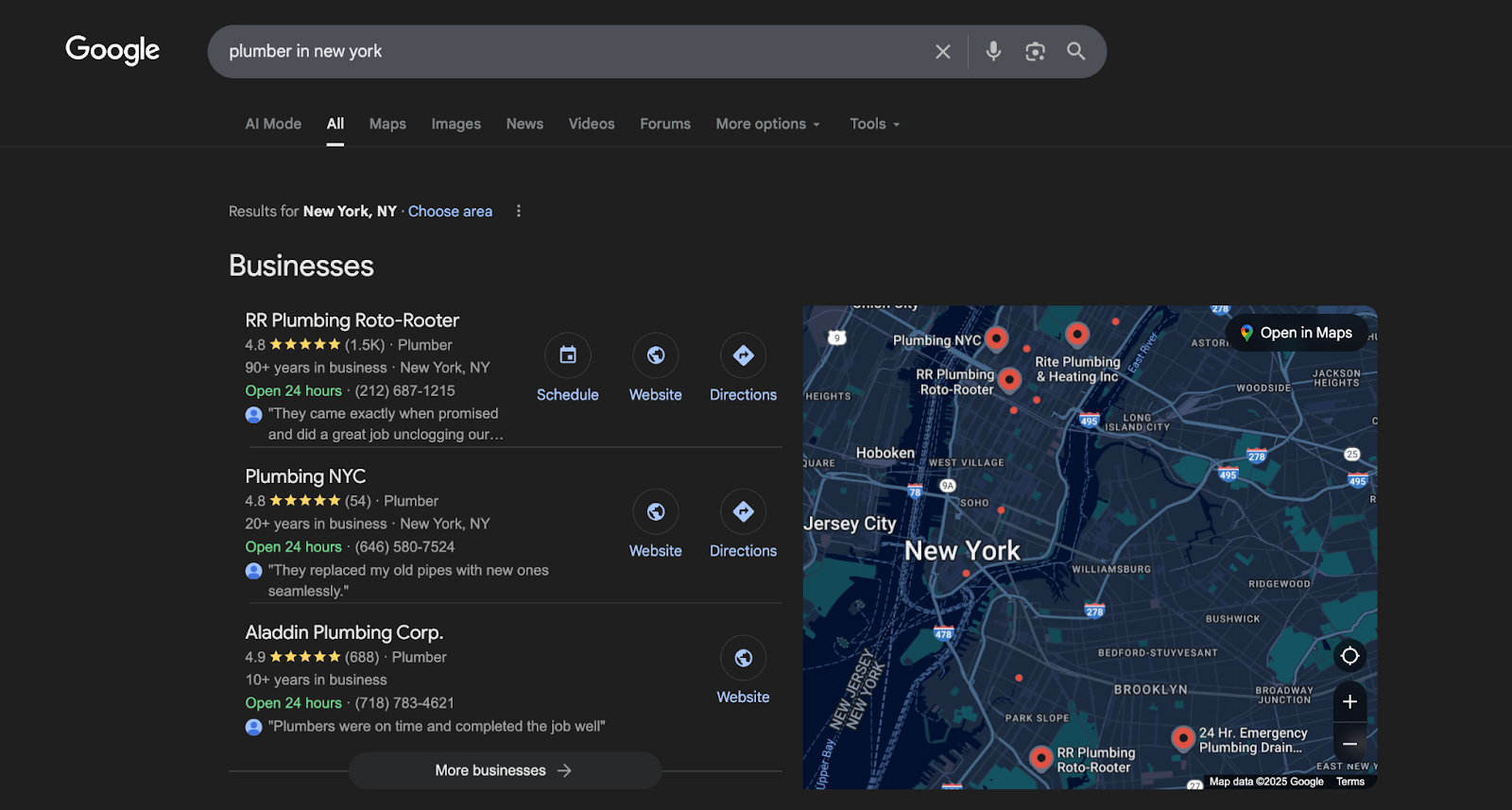
Direct Answer Box
These appear in a box at the top of SERPs, where Google provides a quick answer to a simple question, like asking the time in a state.

Rich Results
Enhanced listings, such as recipes, product reviews, or events, that pull structured data into the search results.

Each of these formats is designed to deliver direct answers. For businesses, they represent both a challenge — fewer clicks — and an opportunity to increase brand visibility in front of potential customers.
Why Are Zero-Click Searches Growing?
It's important to remember that Google’s mission has never been about delivering clicks. Clicks are a by-product of its goal to deliver answers directly. AI Overviews and increasingly sophisticated SERP features are the latest stage in that evolution.
Users want instant, accurate responses to their queries, and search platforms are changing to meet that demand.
At the same time, the commercial reality for search engines is driving this change. More of the search page is being given to paid placements, as ad revenue becomes a bigger driver of search design. AI-generated responses also reduce the need for traditional click searches. In early 2025, only 40.3% of U.S. Google searches resulted in an organic click, down from 44.2% the previous year.
The result is an environment where traditional search engine optimization alone no longer guarantees visibility or growth.
The Risk for Businesses and Brands
For enterprise and SaaS businesses, the risks are significant.
- Fewer leads from organic search: With fewer people clicking through, rankings don’t deliver the same value.
- Attribution gaps: Zero-click results obscure the journey from brand visibility to direct conversions.
- Rising costs: Reliance on paid campaigns is increasing as search traffic shrinks, with CPCs at record highs.
These challenges are fueling the narrative that “SEO is dying.” Here's the rub, though: SEO isn’t dying, but it is evolving, and quickly.
The Opportunity Mindset
Zero-click doesn’t mean zero opportunity. It might seem surprising, but being visible in these placements can deliver as much long-term value as a click. Appearing in a featured snippet, an AI Overview, or a Knowledge Panel places your brand at the centre of the user’s question.
Even if the user doesn’t click immediately, your brand becomes associated with authority and trust. That influence can translate into branded search and potential customers returning later through direct pathways.
According to Elizabeth (Liz) Reid, Google's VP and Head of Search,
"We see the clicks are of higher quality, because they’re not clicking on a webpage, realizing it wasn’t what they want and immediately bailing."
The key shift for enterprises is to treat visibility as a measurable asset. In a zero-click world, the brands that create content optimized for direct answers will own the answer layer and build credibility over time.
SEO Strategies for Zero-Click Success
Businesses need to adapt their SEO playbooks to align with how the search engine results page works today.
Here are some tried-and-tested strategies that will still make big impacts on search performance.
Featured Snippet Optimization
Featured snippets remain one of the strongest zero-click placements. To win them, content must deliver concise, clear answers. Aiming for 40–60-word responses directly addressing the query is best practice. Lists, tables, and step-by-step guides are effective, as they match the formats Google sees as answer-friendly.
Schema Markup
Schema markup helps search engines understand your content and makes it more likely to appear in enhanced results, such as FAQ boxes, How-to snippets, or People Also Ask. Adding structured data to key pages increases your chances of being featured where users are already looking for quick answers. It’s a straightforward way to stand out on crowded results pages and make your content more visible.
Entity-Based SEO
Search engines increasingly rely on entity understanding rather than just keywords. Building authority requires consistent coverage of a topic, linking related questions across content clusters, and earning external mentions. Enterprises that strengthen their entity signals are more likely to appear in Knowledge Panels and related SERP features.
Branded Search Optimization
Many users exposed to zero-click content later conduct branded searches. That means you need to dominate your own branded search results through optimized pages, accurate profiles, and strong brand reputation management. That way, you can capture this demand and drive more traffic from users who already trust your business.
GEO Strategies for the AI Era
SEO alone won’t prepare enterprises for the future. Generative Engine Optimisation (GEO) is about making content visible across generative AI search engines such as ChatGPT, Gemini, and Perplexity.
Use AI-Friendly Content Formats
Generative AI platforms prefer structured content. Q&A sections, bullet points that read as short answers, and clear headings all make it easier for AI engines to pull information into their responses. Well-formatted content increases the likelihood of being cited in AI-generated responses.
Optimize for Conversational Queries
Users often phrase queries in natural language. Optimizing around long tail keywords and conversational phrasing (“what’s the best…”, “how do I…”) ensures your site aligns with how people are actually asking questions. This makes your content more discoverable in AI overviews and generative outputs.
Publish Proprietary Data
Publishing proprietary data, frameworks, and definitions creates referenceable assets for AI engines. Generative AI is more likely to cite brands that offer unique insights, rather than recycling the same content strategy used elsewhere. This is how enterprises can stand out in an increasingly competitive space.
Build Brand Mentions
Generative AI search engines look at how your brand is referenced across the web. When your company is mentioned in trusted articles, industry roundups, forums or comparison pieces, AI engines are more likely to surface you as a credible source. Building brand mentions strengthens authority signals and ensures your expertise is recognised beyond your own domain.
E-E-A-T signals for AI search
Experience, Expertise, Authority, and Trust (E-E-A-T) are critical for generative AI visibility. Businesses should highlight authority and reinforce their credibility with citations and trusted backlinks. In a generative AI environment where misinformation is a concern, content backed by clear E-E-A-T signals is more likely to be surfaced in AI overviews and responses.
How to Measure Success Beyond Clicks
Tracking success in a zero-click environment requires a different mindset. Businesses need to expand reporting beyond standard traffic metrics.
- Visibility share: How often your brand appears on the results page through SERP features, snippets, or Knowledge Panels.
- AI citations: Tracking references in AI overviews and generative AI tools. We created a handy tracking spreadsheet for this here!
- Branded search demand: Increases in branded queries show that zero-click content is building awareness.
- Traffic quality: Focus less on volume and more on engagement, conversions, and revenue impact.
These metrics give a fuller picture of how visibility is turning into impact, even when traditional click-through behaviour declines.
Practical Action Plan for Zero-Click Searches
So, zero-click searches can't be ignored, and dealing with them needs to become part of your wider SEO strategy. How do you do this? You build a clear framework:
- Audit content: Use a free tool or enterprise SEO platform to review which pages are eligible for snippets, schema, or AI citations.
- Optimize for both SEO and GEO: Create content structured for both search engine results and generative outputs. Balance traditional SEO with GEO-friendly strategies like direct answers, clear headings, and structured data.
- Update reporting: Build dashboards that measure success across visibility share, AI citations, and branded demand, not just clicks.
- Collaborate cross-functionally: SEO, content, and brand teams should align around one objective: increasing brand visibility across every type of results page.
This step-by-step approach ensures that enterprises aren’t just chasing rankings but building sustainable visibility in both traditional and generative environments.
The Future Belongs to Visible Brands
You shouldn't view zero-click as the end of SEO. It’s the next stage. The businesses and brands that adapt will thrive in a search landscape where visibility, authority, and AI-driven discovery define success.
Those who fail to embrace the changes risk losing ground to competitors who are already creating zero-click content and preparing for generative AI search.
The future belongs to businesses that are not only found, but are visible wherever users are asking questions.
Want to map your SEO and GEO strategy? Contact us, or book a free call.
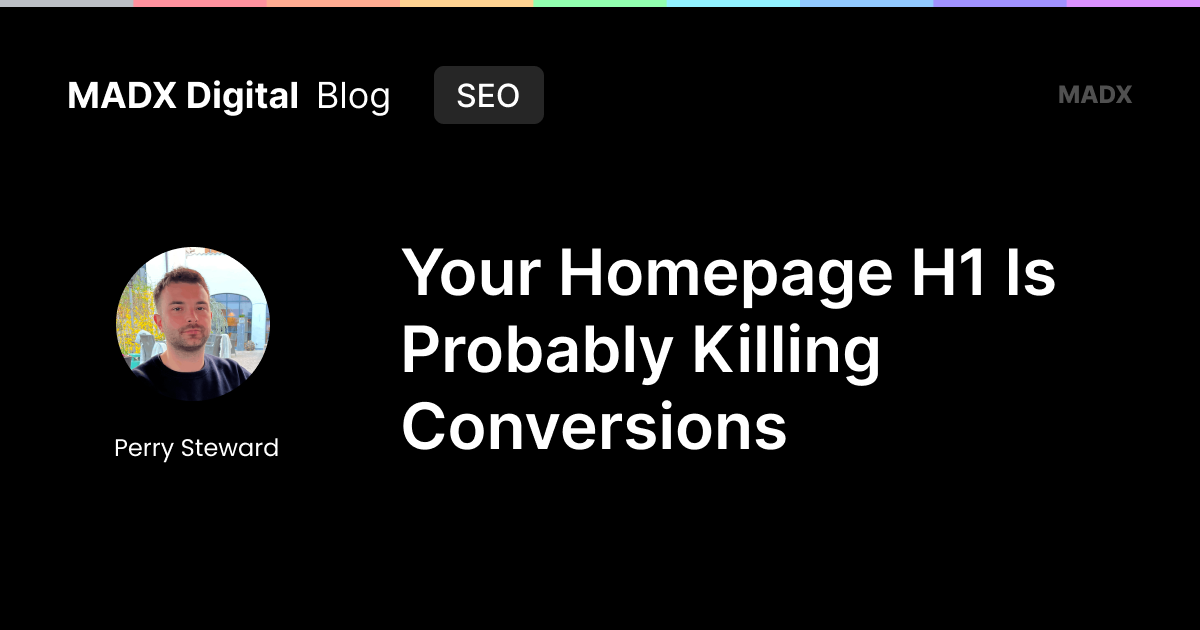
Your Homepage H1 Is Probably Killing Conversions (And It’s Not an SEO Problem)
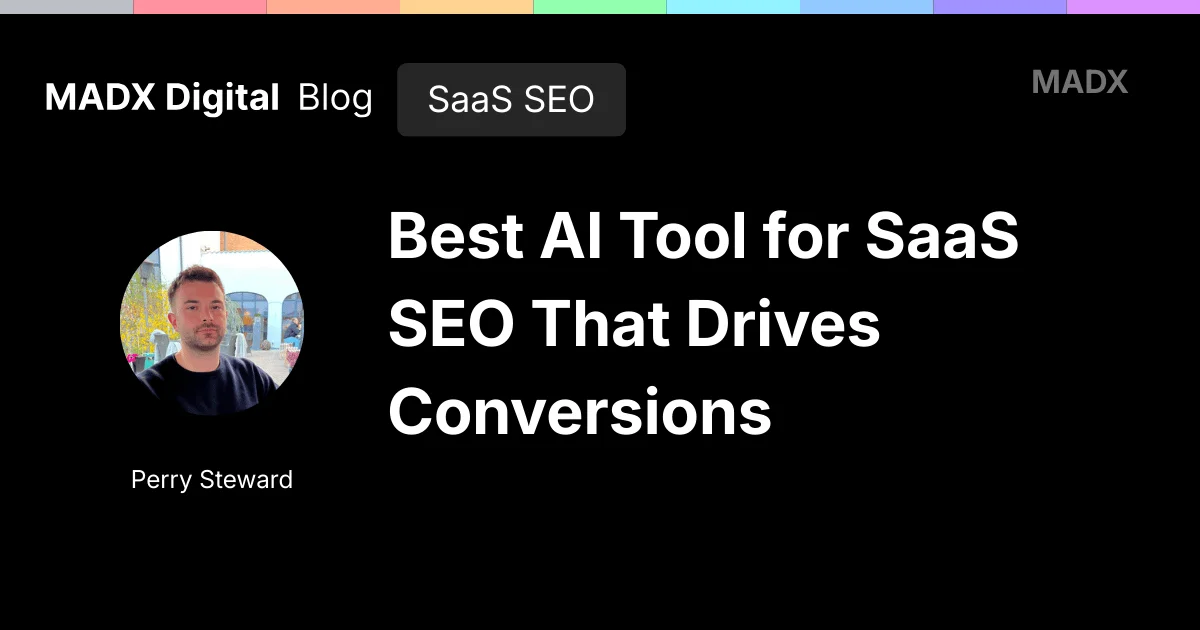
Best AI Tool for SaaS SEO That Drives Conversions
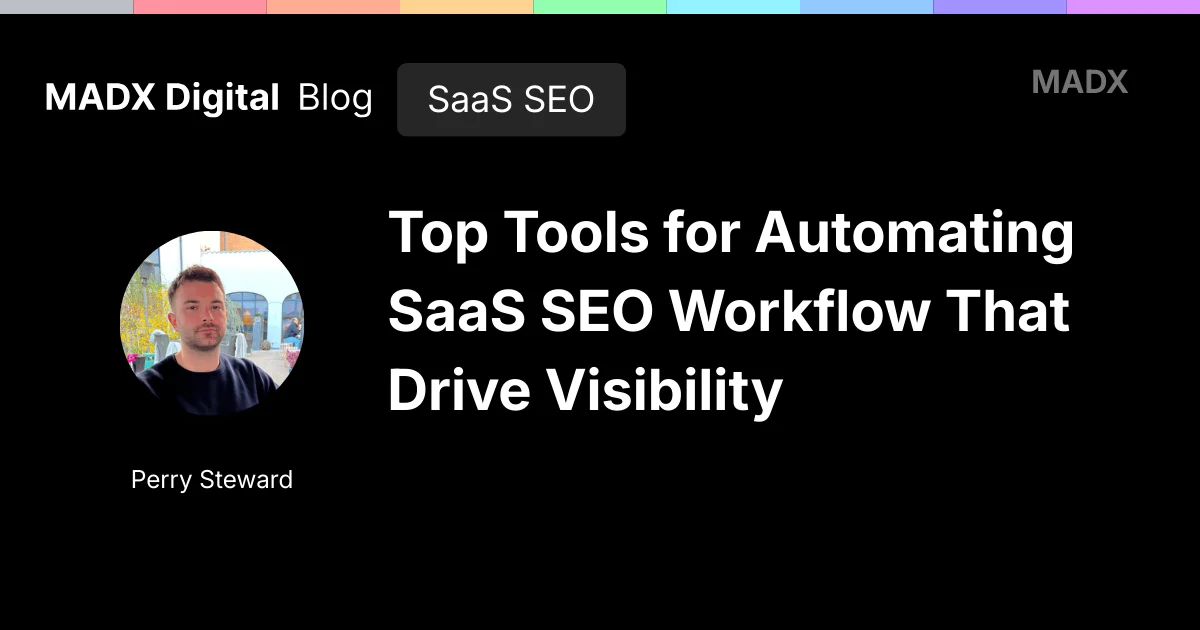
Top Tools for Automating SaaS SEO Workflow That Drive Visibility
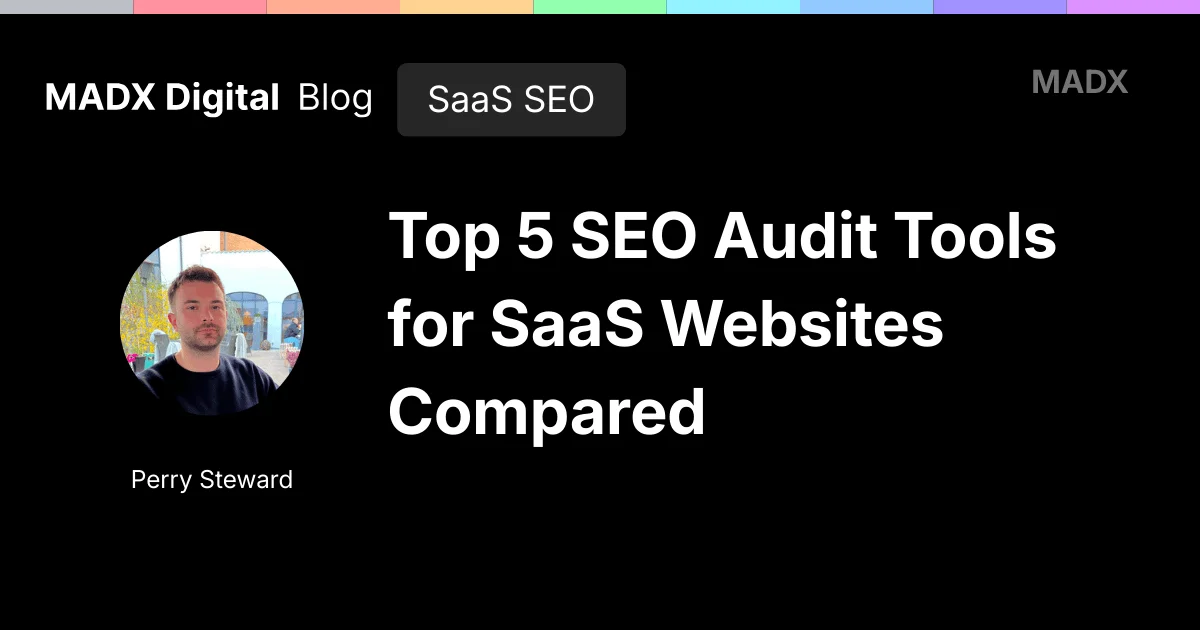
Top 5 SEO Audit Tools for SaaS Websites Compared
